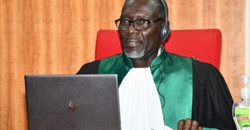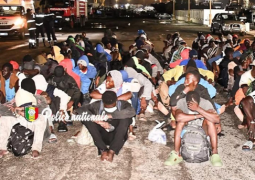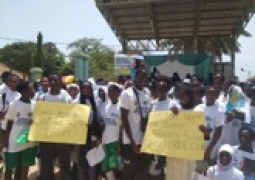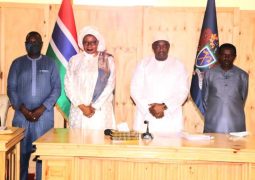
Justice Edward Amoako Asante conveyed the decision at the 12 October 2023 session, to allow the lawyers of the Republic of Ghana regularise their processes.
Isaac Mensah, the Applicant in case ECW/CCJ/APP/47/20 told the Court that his father, Peter Mensah, and 43 other migrant Ghanaians left Senegal for Europe, but were never heard of again. A survivor, Martin Kyere, later disclosed their arrest in The Gambia.
Mensah also told the Court that a 2008 joint UN/ECOWAS inquiry confirmed the suspected killing of some migrants while others remained unaccounted for.
The Applicant stated that without involving the victims’ families, the two countries reached a Memorandum of Understanding (MoU) in which The Gambia declined responsibility but agreed to compensate the families. He said that, thereafter, Ghana conducted a mass burial for some returned bodies without an official investigation, later compensating 27 families with 10,000 cedis ($6,800) each.
Mensah further claimed that the family never heard about the case again, despite the fact that in July 2019, two former soldiers confessed that the migrants were killed on orders from Yaya Jammeh, former president of The Gambia.
He averred that the Respondent has violated the right to information as his family wrote several letters to the Ghanaian government to request some documents related to the circumstances of the events, without response.
Mensah urged the Court to hold Ghana accountable for neglecting proper investigative and reparative measures. He sought a court directive for an official investigation, disclosure of related documents, and compensation of 1,500,000 US dollars.
In its response, Ghana emphasised that the crimes occurred in The Gambia and, thus, were beyond their jurisdiction, citing sovereignty principles.
The Respondent said that in investigating extraterritorial crimes, international cooperation was necessary. It added that contacts had been made and that an agreement was in place with The Gambia to bring the perpetrators to book. They also pointed out to the UN/ECOWAS fact-finding team to which both countries were members and whose report led to financial compensation by The Gambia to the families.
Regarding information rights, Ghana claimed some report details required waivers due to their confidential or the potential repercussions.
In its conclusion, the Respondent State implored the Court to recognize the unique nature of this case and acknowledge efforts it was making to ensure investigation.
The panel of judges also included Justices Gbéri-bè Ouattara and Ricardo Cláudio Monteiro Gonçalves.
Source: ECOWAS
Read Other Articles In Headlines

29 Gambians among 147 migrants intercepted by Senegalese authorities
Aug 21, 2025, 11:22 AM



